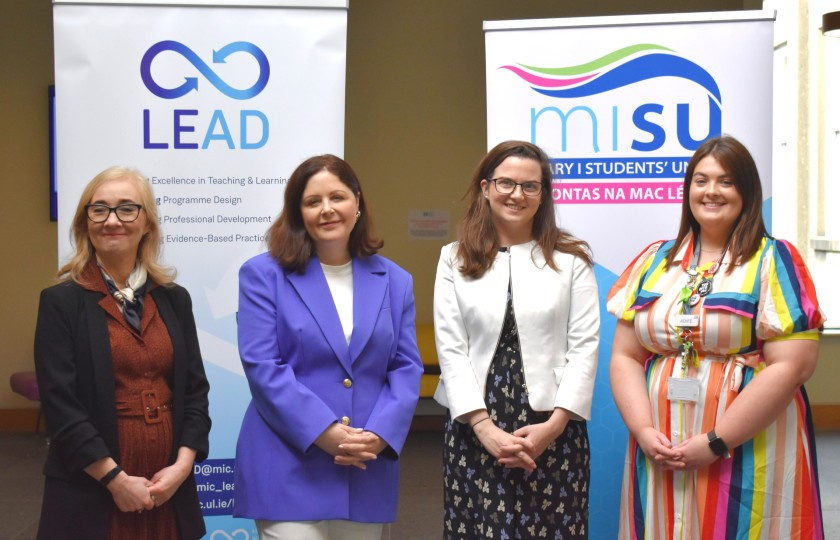
Pictured: Dr Geraldine Brosnan, Director of Student Life; Professor Niamh Hourigan, Vice-President of Academic Affairs at MIC; Dr Laura Costelloe, Assistant Professor in Academic Practice within the Learning Enhancement and Academic Development Centre; Aoife Gleeson, President of Mary Immaculate Students' Union (MISU).
National Academic Integrity Week is being celebrated at Mary Immaculate College (MIC) this week with a number of events taking place to share guidance and best practice in cultivating academic integrity across the Higher Education sector. The week aims to highlight the importance of upholding high standards of academic integrity and to further develop practices and supports for students to assist them in their academic endeavours.
According to Professor Niamh Hourigan, Vice-President of Academic Affairs at MIC: “It is vital that academic assessment is fair and academic integrity is essential to ensuring that fairness. Understanding the meaning of academic integrity and grasping the ways in which it can be compromised through plagiarism and syndication are very significant steps in student's academic journey. Here at MIC, Academic Integrity Week provides us with a really important opportunity to draw attention to current definitions of academic integrity in partnership with students and academic staff. Students are making huge sacrifices to attend higher education and promoting academic integrity means that all students can experience a fair system of assessment where their genuine efforts and hard work are fully rewarded.”
Academic Integrity is underpinned by five fundamental values, namely Honesty, Trust, Fairness, Respect and Responsibility, as defined by Quality and Qualifications Ireland (QQI). The concept is deeply embedded in all of MIC’s undergraduate and postgraduate programmes, and enables students to put forward ideas and insights whilst acknowledging and respecting the work of others who have shaped those ideas and insights.
Outlining the ways in which MIC encourages academic integrity amongst its students, Dr Geraldine Brosnan, Director of Student Life at MIC, said: “Understanding the key concepts and mechanics of academic integrity are an integral component of our undergraduate degree programmes here at MIC. All students on our undergraduate programmes undertake a generic skills programme during their first semester at the College. In these generic skills programmes, all students participate in a suite of instruction seminars on academic writing, which are designed by experts in the area. These seminars are both mandatory and examinable ensuring that students are fully informed on all issues in relation to plagiarism, cheating and other dishonest academic endeavours.”
For higher education teachers, it is important to consider how they can support students to create authentic, self-authored assessments which adhere to the principles of academic integrity. According to Dr Laura Costelloe, Assistant Professor in Academic Practice within the Learning Enhancement and Academic Development Centre (LEAD): “Academic integrity is a key concern for all of us in higher education, and both careful assessment design and ongoing formative feedback are important mechanisms to support students. Plagiarism and contract cheating pose enormous threats to the integrity of our academic programmes, and LEAD is committed to working with higher education teachers to embed the principles of academic integrity across the programmes and modules in MIC.”
A keynote speech by Dr Mary Davis from Oxford Brookes University on Monday leads the line-up of events, with further panel discussions and webinars taking place throughout the week. The full schedule of events organised as part of National Academic Week can be found here.
A dedicated Academic Integrity Hub is available by clicking here. The Hub contains easy to access resources for students, such as MIC’s Academic Integrity Policy and Study Skills Handbook, as well as a suite of resources on citing and referencing developed by MIC’s Library. Registration information and MS Teams links for the all scheduled webinars can also be found on the Academic Integrity Hub.



